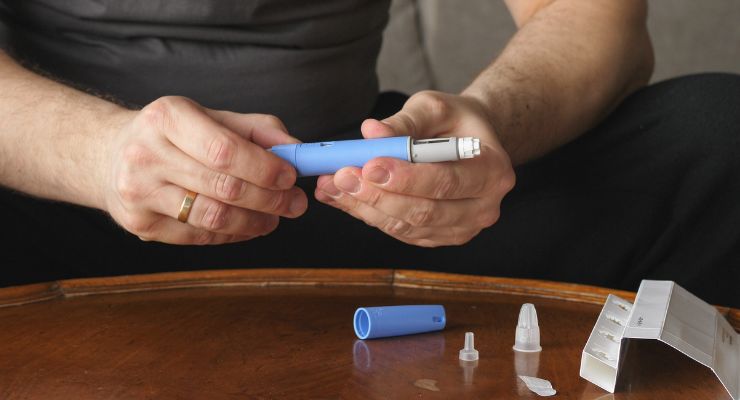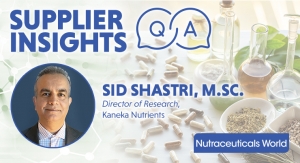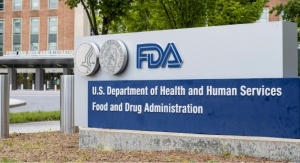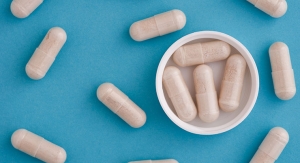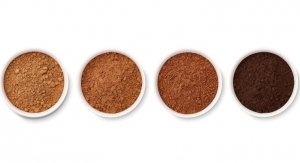By Mike Montemarano, Associate Editor04.09.24
More than 1 billion people around the world are living with obesity, affecting an estimated 43% of adults. With growing popularity of new glucagon-like peptide 1 (GLP-1) agonists for diabetes and weight loss, more healthcare practitioners are prescribing these new drugs to patients.
J.P. Morgan has predicted that total GLP-1 users in the U.S. may number 30 million by 2030, or around 9% of the overall population. It also noted the GLP-1 market could exceed $100 billion by 2030.
Analysts at Natural Products Expo West in March discussed what growing use of GLP-1 drugs may mean for the dietary supplement industry.
“With the preservation of the health span in mind, there are plenty of opportunities to serve consumers who are on these drugs, and have a lot of things to deal with, including the early stage of adjusting to the drug’s side effects, and sustaining weight loss after they discontinue using them,” Kleiner said. “It’s an opportunity to offer a more natural way to support weight management for the rest of one’s life.”
Marc Washington, founder and CEO of Supergut said that people sometimes refer to new GLP-1 drugs as “injectable willpower” due to their effect of controlling appetite and cravings.
“But there will be a new level of interest and opportunity for the nutrition space as people begin thinking about what they can do for cravings control, liver health, blood sugar, and more,” he said.
“There is also plenty of opportunity to address the deficits induced by these drugs, and the myriad of other problems caused by pharmaceutical use for weight loss,” Kalman noted. “Everyone is getting direct-to-consumer products with a ‘doc in a box’ instructing them to use a specific compound or drug. There’s room for improvement on many levels.”
“I look at the body as an ecosystem, where there are many imbalances to correct,” Maes said. “Whether or not you choose the pharmaceutical pathway, weight loss journeys always require a multi-metabolic approach, and without proper guidance, people won’t use these medications the right way. Prolonged use of these medications is unsustainable, both because of the malnutrition it induces and because the body becomes desensitized to its effects. So this scares me as a naturopath.”
From a consumer research standpoint, data on GLP-1 users gathered by NielsenIQ suggest that drugs are being used as a standalone, and these users shift away from supplements and healthier dietary patterns, said Sherry Frey, vice president of total wellness at NielsenIQ.
“There’s opportunity for the supplements industry because what we’re seeing in terms of behavioral changes isn’t fantastic,” she said. “People are struggling from a GI standpoint, and are buying a lot of over-the-counter anti-nausea drugs. They’re shifting away from supplementation, and aren’t necessarily buying healthier foods than before. They’re not eating produce, and they’re moving away from the natural channel to the C-store.”
According to Kleiner, many people are resorting to GLP-1 drugs to lose a substantial amount of weight, after spending a lifetime ignoring the health and wellness market and denying the recommendations made by their physicians.
“Now that this audience is more medically inclined, they might want to see RDs and other trusted informants speaking on behalf of brands,” she said. Similarly, “allying with the practitioner community is very important. There will always be the doctor that hands out Ozempic like candy, but then there are doctors who really care about their patients, so allying with bariatric medicine or the specialty practitioner arena is an important place where we should be educating as well.”
For current and former GLP-1 users, as well as curious consumers, the nutrition industry should leverage the strengths of supplementation in supporting both satiety and mental wellness, Washington and Kalman noted.
“Nutraceuticals won’t be a replacement or a replica for Ozempic, but targeting the metabolic processes behind appetite, blood sugar, and more is tied to fiber, which is completely absent in the western diet,” said Washington. “In addition to producing its well-known byproducts like butyrate and other short-chain fatty acids, fiber triggers mechanisms within the gut like the production of GLP-1 and other hormones that keep you feeling naturally satiated. It won’t reduce calorie intake by 30% on average, but it’ll reduce the hunger noise in people; only about 5% of adults in this country even manage to get the minimum amount of fiber recommended in their diet.”
“If the marketing of berberine or another supplement as ‘nature’s Ozempic’ was accurate, the world wouldn’t be so obese,” Kalman said. “People need full nutritional programs that can both improve feelings of satiety and mental wellness, because reductions in calorie intake cause people to have worse moods. I believe we’re presented with an opportunity to reimagine how weight loss is presented to consumers by this industry.”
“Often, the natural products industry positions itself as the other option from the pharmaceutical industry,” Kalman said, but it may be more useful to show how nutrition plans can make weight loss goals more attainable both as a standalone or adjuvant therapy.
J.P. Morgan has predicted that total GLP-1 users in the U.S. may number 30 million by 2030, or around 9% of the overall population. It also noted the GLP-1 market could exceed $100 billion by 2030.
Analysts at Natural Products Expo West in March discussed what growing use of GLP-1 drugs may mean for the dietary supplement industry.
New Market Opportunities in Next-Gen Weight Loss
While some may have thought the new pharmaceutical option for weight management would encroach on the weight loss supplements market, it has instead created emerging opportunities both for users and non-users of these drugs, noted Susan Kleiner, owner of nutrition consulting firm High Performance Nutrition.“With the preservation of the health span in mind, there are plenty of opportunities to serve consumers who are on these drugs, and have a lot of things to deal with, including the early stage of adjusting to the drug’s side effects, and sustaining weight loss after they discontinue using them,” Kleiner said. “It’s an opportunity to offer a more natural way to support weight management for the rest of one’s life.”
Marc Washington, founder and CEO of Supergut said that people sometimes refer to new GLP-1 drugs as “injectable willpower” due to their effect of controlling appetite and cravings.
“But there will be a new level of interest and opportunity for the nutrition space as people begin thinking about what they can do for cravings control, liver health, blood sugar, and more,” he said.
Providing Lifestyle Guidance the Pharmaceutical Industry Won’t Offer
Douglas Kalman, nutrition researcher and professor at Nova Southeastern University, said the time is now for the natural products industry to move away from products that promise rapid, easy weight loss, and instead provide products and guidance that complement the long-term lifestyle changes that are required for meaningful weight loss.“There is also plenty of opportunity to address the deficits induced by these drugs, and the myriad of other problems caused by pharmaceutical use for weight loss,” Kalman noted. “Everyone is getting direct-to-consumer products with a ‘doc in a box’ instructing them to use a specific compound or drug. There’s room for improvement on many levels.”
Drawbacks
Luc Maes, ND, co-founder of Kaibae, said that he’s concerned as a naturopathic doctor about the adverse health impacts that these drugs might have, which can make their use unsustainable.“I look at the body as an ecosystem, where there are many imbalances to correct,” Maes said. “Whether or not you choose the pharmaceutical pathway, weight loss journeys always require a multi-metabolic approach, and without proper guidance, people won’t use these medications the right way. Prolonged use of these medications is unsustainable, both because of the malnutrition it induces and because the body becomes desensitized to its effects. So this scares me as a naturopath.”
From a consumer research standpoint, data on GLP-1 users gathered by NielsenIQ suggest that drugs are being used as a standalone, and these users shift away from supplements and healthier dietary patterns, said Sherry Frey, vice president of total wellness at NielsenIQ.
“There’s opportunity for the supplements industry because what we’re seeing in terms of behavioral changes isn’t fantastic,” she said. “People are struggling from a GI standpoint, and are buying a lot of over-the-counter anti-nausea drugs. They’re shifting away from supplementation, and aren’t necessarily buying healthier foods than before. They’re not eating produce, and they’re moving away from the natural channel to the C-store.”
According to Kleiner, many people are resorting to GLP-1 drugs to lose a substantial amount of weight, after spending a lifetime ignoring the health and wellness market and denying the recommendations made by their physicians.
“Now that this audience is more medically inclined, they might want to see RDs and other trusted informants speaking on behalf of brands,” she said. Similarly, “allying with the practitioner community is very important. There will always be the doctor that hands out Ozempic like candy, but then there are doctors who really care about their patients, so allying with bariatric medicine or the specialty practitioner arena is an important place where we should be educating as well.”
For current and former GLP-1 users, as well as curious consumers, the nutrition industry should leverage the strengths of supplementation in supporting both satiety and mental wellness, Washington and Kalman noted.
“Nutraceuticals won’t be a replacement or a replica for Ozempic, but targeting the metabolic processes behind appetite, blood sugar, and more is tied to fiber, which is completely absent in the western diet,” said Washington. “In addition to producing its well-known byproducts like butyrate and other short-chain fatty acids, fiber triggers mechanisms within the gut like the production of GLP-1 and other hormones that keep you feeling naturally satiated. It won’t reduce calorie intake by 30% on average, but it’ll reduce the hunger noise in people; only about 5% of adults in this country even manage to get the minimum amount of fiber recommended in their diet.”
“If the marketing of berberine or another supplement as ‘nature’s Ozempic’ was accurate, the world wouldn’t be so obese,” Kalman said. “People need full nutritional programs that can both improve feelings of satiety and mental wellness, because reductions in calorie intake cause people to have worse moods. I believe we’re presented with an opportunity to reimagine how weight loss is presented to consumers by this industry.”
“Often, the natural products industry positions itself as the other option from the pharmaceutical industry,” Kalman said, but it may be more useful to show how nutrition plans can make weight loss goals more attainable both as a standalone or adjuvant therapy.

